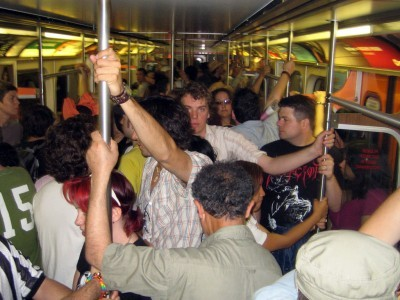There are many barriers between people; language, bias, emotions, national borders, and prison walls. Some are clearly visible, while others are hidden and often disguised. There is one barrier, however, that is indistinguishable from the body itself, and that is the barrier of “personal space”.
There is an invisible barrier around each person within which a particular person feels comfortable. The size of the barrier seems to be different depending on the person and their particular mood. If someone moves inside that barrier uninvited, then the individual will begin to feel uncomfortable, offended, and sometimes even angry. In America we call this invisible barrier our “Personal Space”. If someone moves inside that space, then the action is considered rude and often is enough to invoke some form of retaliation, including a fight.
In Ukraine, however, the idea of personal space is far more flexible. The various forms of crowded public transportation have desensitized the people living in the former Soviet Union to invasions of their personal space. It is common in Ukraine to stand in a marshrutka so stuffed with people that your chest is pressed against someone’s back and your back is pressed against someone else’s chest creating a kind of human sandwich. Often on the metro and in buses faces are confronted with armpits, legs are entangled, bottoms and bellies are squished, and complete strangers quickly become intimate acquaintances.
In the USA this would be unheard of. Personal space is well defined socially in America, and violations are considered highly out of the ordinary. When walking one should always remain at least a foot from other people, and when walking through a group of people one should always turn the shoulders so as not to touch the other people’s bodies. Even on buses and on crowded transport, Americans will try as hard as possible not to touch other people or their possessions.
When standing Americans will contort their bodies as much as possible to avoid contact with others. When sitting they will place their arms and legs together and take up as little space as possible so as not to touch the legs or arms of the person sitting next to them. If you bump someone or touch them in any way an apology is expected. If the bump is hard, even an apology may not be enough.
The degree of pushing on the metro during rush hour here was so shocking that when I first felt myself physically shoved into the wagon I thought I was going to have to fight with whoever was doing the pushing. My first experience was in Moscow, where the pushing was so hard that I ended up hanging over the benches with my legs several feet behind me, completely off balance. I had to hold on to the safety bar with all my strength, otherwise I would have fallen onto the lap of the unfortunate person below me.
I soon realized, however, that no one was coaxing me into a fight. Ukrainians simply have a different sense of personal space. Everyone pushes to get on the metro, because it’s the only way to get on at the last moment. People squeeze into marshrutkas and buses because public transportation is not frequent enough to allow people to wait for the next bus. It’s the only way to get on.
Even in simple conversations people in Ukraine speak very close to other people’s faces, which in America is a sign of aggression. I often thought that people I saw talking to one another on the street were angry, until I realized that it is normal to talk very close to other people’s faces here, perhaps to prevent others from spying in on your conversations. In the USA a distance of 6 inches is the bare minimum when speaking to someone else.
Now I know that relationships in Ukraine are much more physical than they are in the USA. Men can kiss each other on the cheek, women often hold hands when they walk, and men always take women’s hands to help them off buses and trams. All of these are considered unusual in America, especially the kissing.
Perhaps it’s better to not worry so much about personal space. Ukrainians have what we call “thick skin”, which means they are strong and not easily offended. And Ukrainians are physically close to one another, and personal relationships are highly valued. Hopefully I and my fellow expatriates here can learn to not be offended by people bumping into us, pushing on the metro, and physical touching. Until then, just remember that “personal space” is not internationally regulated and differs according to culture.

